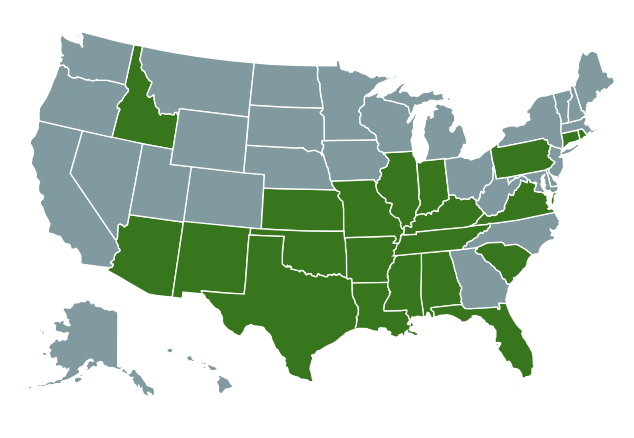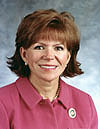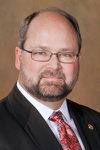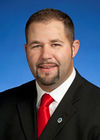State legislative responses to Obergefell v. Hodges
![]() This article may not adhere to Ballotpedia’s current neutrality policies.
This article may not adhere to Ballotpedia’s current neutrality policies.
Originally published July 2, 2015
Last updated January 25, 2016
By Jackie Beran
Follow @ballotpedia
On June 26, 2015, in a landmark United States Supreme Court decision, the Court held in Obergefell v. Hodges that same-sex marriage is protected under the Due Process and Equal Protection Clauses of the Fourteenth Amendment. Consequently, same-sex marriage bans have been struck down as unconstitutional, and same-sex marriages performed out of state must be recognized in other states.[1] Justice Anthony Kennedy authored the opinion and Justices Ruth Ginsburg, Stephen Breyer, Sonia Sotomayor and Elena Kagan joined. Chief Justice John Roberts and Justices Antonin Scalia, Clarence Thomas and Samuel Alito each authored a dissent.
Despite the decision, some state lawmakers across the country are in the process of proposing legislation that would make it more difficult for same-sex couples to marry. State lawmakers in Arkansas, Florida, Kentucky, Michigan, Ohio, Tennessee, Utah and Wisconsin have all drafted legislation in the days following the decision in relation to same-sex marriage. Legislation in those states has varied from a Religious Freedom Restoration Act in Michigan to a bill in Utah that would put an end to the state issuing marriage licenses. Not all legislation being proposed has been against same-sex marriage. Two representatives in Wisconsin have proposed legislation that would remove language from the state's constitution that recognizes marriage as only between one man and one woman.
- See also: State executive responses, Local government responses to Obergefell v. Hodges and presidential candidate responses to the ruling
State Religious Freedom Restoration Acts
The Religious Freedom Restoration Act (RFRA) is a federal law that was signed in 1993 by President Bill Clinton (D).[2] The law was designed "to protect religious individuals and organizations against government interference with the practice of their faith."[3] In 1997, the U.S. Supreme Court decided in the City of Boerne v. Flores decision that the federal Religious Freedom Restoration Act did not apply to the states.[4] As of July 1, 2015, twenty-one states had enacted state religious freedom restoration acts. In 2015, Indiana and Arkansas became the latest states to enact RFRAs.
Green: The 21 states that have enacted state RFRAs
Prior restrictions on same-sex marriage
Prior to the June 26 ruling, 15 states had or attempted to institute bans on same-sex marriage. In the seven states denoted in yellow, each state's ban was ruled unconstitutional by either a state or federal court. However, in all seven states, enforcement of these rulings was stayed pending a decision by a higher court. The seven states denoted in red are states where a ban on same-sex marriage was in place and fully enforced. In the single state denoted in purple, the status of same-sex marriage was legally unclear; some counties in Kansas were issuing licenses to same-sex couples, but state officials enforced a ban across the state.
Yellow Ban on same-sex marriage ruled unconstitutional, but enforcement stayed until Supreme Court ruling: Alabama, Arkansas, Mississippi, Missouri[5], Nebraska, South Dakota and Texas
Red Ban on same-sex marriage in place: Georgia, Kentucky, Louisiana, Michigan, North Dakota, Ohio and Tennessee
Purple Complicated legal status: Kansas
Responses by state lawmakers
In response to the ruling of the Supreme Court, state lawmakers across the country have varied from acceptance of the ruling to calling the ruling unlawful and proposing legislation that would make it more difficult for same-sex couples to marry. This page will be updated as additional responses become available.
Arkansas
Following the decision, the Republican caucus in both the state Senate and House of Representatives have pledged to draft legislation that would protect people and churches from the ruling.[6]
On June 30, 2015, the Republican House Caucus issued a statement, which was written by Majority leader Ken Bragg (R).[7]
| “ | We refuse to simply shrug our shoulders and abandon basic principles that have guided our country successfully the past 239 years. We will work with other conservative leaders in our state and across the nation, strengthen the bonds of unity, and explore all available options. That certainly includes increased legislative protections for our First Amendment freedoms to exercise religion.[8] | ” |
| —Rep. Ken Bragg (R)[7] | ||
On July 2, 2015, the Republican Senate Caucus released a statement, which was written by Majority leader Jim Hendren (R) and signed by all 24 Republicans.[7]
| “ | We will pass legislation in Arkansas to ensure that these organizations may choose not to participate in or host marriages that violate their religious beliefs.[8] | ” |
| —Sen. Jim Hendren (R)[7] | ||
Florida
Two state lawmakers are in the process of drafting a bill that would protect pastors and other religious leaders from having to perform same-sex marriages.[9] Both Rep. Scott Plakon (R) and Sen. Aaron Bean (R) were in the process of drafting separate versions of the bill before the ruling, but following the decision they will now collaborate together on the bill before it is introduced before the Florida State Legislature.[9]
| “ | Senator Bean and I want to make it absolutely clear in Florida law that pastors and religious practitioners have First Amendment rights to practice their faith when it comes to marriages. We've already spoken with a handful of pastors and they are very concerned about this and how it is progressing.
To pass legislation is a very difficult thing to do. But at the end of the day, we should have the bipartisan support. It should be obvious that churches, pastors and clergy deserve this type of protection.[8] |
” |
| —Rep. Scott Plakon (R)[9] | ||
Kentucky
On July 2, 2015, Rep. Addia Wuchner (R) announced that she had pre-filed House BR102 for the 2016 legislative session. This bill would "excuse people from civil or criminal liability for refusing to conduct a same-sex marriage."[10]
| “ | While respecting the opinions and life choices of others regardless of their positions on the matter, the intent of BR102 is to provide clarity and protect the religious freedom of individuals and institutions to proclaim the Gospel message and provide ministerial services without prejudice and to practice their long held religious convictions and faith traditions. As we celebrate Independence Day this 4th of July, we are again reminded that the cornerstone of Liberty rests in the freedom of our citizens to practice their belief and faith according to the dictates of their own conscious.[8] | ” |
| —Rep. Addia Wuchner (R)[11] | ||
Michigan
Following the ruling, Sen. Mike Shirkey's (R) controversial Religious Freedom Restoration Act bill—which is supported by many Republicans—may be heard in the Michigan State Senate this legislative session.[12]
| “ | I think the states now have the responsibility to step in and make sure they're protecting their citizens.[8] | ” |
| —Sen. Mike Shirkey (R)[12] | ||
The proposed legislation would protect religious practices against government interference.[12] The Senate Judiciary Committee heard testimony on the bill in April, but did not hold a vote.[13] At the time, Sen. Steven Bieda, the top Democrat on the Senate Judiciary Committee, did not believe it was the right time to take up the bill because of the backlash from a similar bill in Indiana.[13]
Shirkey's sentiments were echoed by Senate Majority Leader Arlan Meekhof (R), and he made the following statement regarding the Supreme Court’s ruling on same-sex marriage:
| “ | I have always believed that marriage is the union of one man and one woman before God. While I respect the decision made today by the Supreme Court, I am concerned by the Court’s decision to disregard states’ rights in favor of the federal government.
I share the belief of many Americans that marriage should not be relegated to an agreement defined by the federal government, but rather as a sacred bond made within one’s religion and before God. Marriage is the fundamental building block of family and of our society and while families come in many forms, marriage should be held in high regard as a religious covenant. I join many men and women who are disappointed by the Court’s ruling and I will take time to consider any measures that seek to protect religious freedom in Michigan.[8] |
” |
| —Sen. Arlan Meekhof (R)[14] | ||
While Sen. Shirkey (R) and Sen. Meekhof (R) criticized the ruling, Sen. Curtis Hertel (D) defended the ruling and criticized Republicans who were discussing RFRA only days after the decision.[12] To show his support of the ruling, Hertel attended the same-sex marriage of a couple on June 26.[12]
| “ | But in Michigan, this couple could still be legally fired because they're gay. I was appalled and dismayed to see some of my colleagues pledge to pass the Religious Freedom Restoration Act within hours of the decision. We need to bring to an end the mean-spirited attacks on the LGBT community and pass an Elliott-Larsen expansion. At long last, to do the right thing and finally be on the right side of history.[8] | ” |
| —Sen. Curtis Hertel (D)[15] | ||
In anticipation of the ruling, Rep. Todd Courser (R) introduced legislation that would prohibit judges and local clerks from performing same-sex marriages.[15] Instead, couples would need to be married by a clergy member or file an affidavit of marriage to county clerks.[15]
| “ | If this legislation becomes law it will protect our public officials from having to perform same-sex marriages and put the marriage licensing business back in the position of being in the realm of the churches and religious leaders.[8] | ” |
| —Rep. Todd Courser (D)[15] | ||
Ohio
Four days after the ruling, Rep. Nino Vitale (R) announced the Pastors Protection Act.[16] The legislation would protect church leaders and property from lawsuits and would also give clergy the freedom to perform only marriage ceremonies that are in line with their religious beliefs.[16]
| “ | This is not an issue of discrimination. It is an issue of protection; protection for those who have committed their lives to the service of God and their community.[8] | ” |
| —Rep. Nino Vitale (R)[16] | ||
Tennessee
In response to the ruling, two state representatives, Rep. Bryan Terry (R) and Rep. Andrew H. Holt (R), are drafting a bill called the "Tennessee Pastor Protection Act." This bill would protect pastors who refuse to perform same-sex wedding ceremonies for religious reasons.[17]
| “ | It comes as no surprise that the Supreme Court ruled in favor of same sex marriage. I have had multiple constituents concerned with how the ruling may impact their church and their religious beliefs. If the issue is truly about equality of civil liberties and benefits, then this ruling should have minimal legal impact on churches. However, if the issue and the cause is about redefining marriage to require others to change their deeply held religious beliefs, then the concerns of many will be valid.
To my friends of faith, to those who endear the principles of social conservatism, and to those who ascribe to the original intent of the Tenth Amendment, we must never give up. The Court has made it clear that they have no intention to uphold the principles of separation of power. It’s more important now than ever that we stand and resist the abuse of our own government and that is exactly what I plan to do by lobbying for the Pastor Protection Act with Rep. Terry.[8] |
” |
| —Rep. Andrew Holt (R)[18] | ||
Rep. Holt Introduces Pastor Protection Act In reaction To Gay Marriage Ruling
On January 20, 2016, a bill introduced by Rep. Mark Pody (R) and Sen. Mae Beavers (R) was killed in the House Civil Justice subcommittee before it could reach the House floor. HB1412 or better known as the Tennessee Natural Marriage Defense Act, would have directed state officials to ignore the U.S. Supreme Court ruling that legalized same-sex marriage.[19]
Utah
Following the ruling, a Utah lawmaker has drafted legislation that would end the state’s issuance of marriage licenses.[20] The author and the exact language of the legislation are unknown, but the local television station, Salt Lake City Fox 13, has confirmed the story through another legislator.[20] Rep. Jake Anderegg (R) confirmed that it is not his bill, but said that he was aware of the bill and supported the concept.[20]
Sen. Jim Dabakis (D) made the following statement regarding the supposed legislation:
| “ | I'm a Democrat and I am gay and I know in Utah what it's like to lose, so these guys, they might be saying things in this moment as this is happening that they may have second thoughts about. The idea of destroying marriage entirely because gay people can get married now would probably not withstand the scrutiny of some clear thought away from the decision.[8] | ” |
| —Sen. Jim Dabakis (D)[21] | ||
Wisconsin
In response to the ruling, two state representatives, JoCasta Zamarripa (D) and Mark Spreitzer (D), are proposing a constitutional amendment that would remove language from the state constitution recognizing marriage as only between one man and one woman.[22] The bill would need to pass in two consecutive legislative sessions before it could go the ballot.[22]
Assembly Speaker Robin Vos (R) made the following statement regarding the proposal made by Zamarripa and Spreitzer:
| “ | I certainly think that, at a point like that, the U.S. Supreme Court has already made a definition. We already know that same-sex marriage is legal in Wisconsin because of what the U.S. Supreme Court did. So I understand where some people are continuing to try to make a political point out of it. But the Supreme Court has already decided, Gov. Walker has said we're going to live with that ruling, so it seems like it's a lot more political.[8] | ” |
| —Rep. Robin Vos (R)[22] | ||
See also
- Marriage and family on the ballot
- Obergefell v. Hodges
- Same-sex marriage in the federal courts
- 2016 presidential candidates on Obergefell v. Hodges
- State executive responses to Obergefell v. Hodges
- Local government responses to Obergefell v. Hodges
External links
- Infographic World, "LGBT Rights Around the World"
- Pew Research Center, "Same-Sex Marriage, State by State"
- Pew Research Center, "Gay Marriage Around the World"
Footnotes
- ↑ SupremeCourt.gov, "Obergefell v. Hodges, No. 14-556," June 26, 2015
- ↑ NY Times, "Clinton Signs Law Protecting Religious Practices," accessed July 1, 2015
- ↑ US Legal, "Religious Freedom Restoration Act Law & Legal Definition," accessed July 1, 2015
- ↑ ncsl.org, "State Religious Freedom Restoration Acts," accessed July 1, 2015
- ↑ In St. Louis, marriage licenses were issued to same-sex couples despite the ban.
- ↑ 5newsonline.com, "Ark. Senate Republicans To Propose Legislation Securing Religious Freedoms," July 2, 2015
- ↑ 7.0 7.1 7.2 7.3 swtimes.com, "Arkansas State GOP Lawmakers Plan Legislation To Address Gay Marriage," July 3, 2015
- ↑ 8.00 8.01 8.02 8.03 8.04 8.05 8.06 8.07 8.08 8.09 8.10 8.11 Note: This text is quoted verbatim from the original source. Any inconsistencies are attributable to the original source.
- ↑ 9.0 9.1 9.2 charismanews.com, "Two Florida State Lawmakers Sponsor Version of Pastor Protection Act," accessed July 2, 2015
- ↑ Kentucky.com, "Kentucky legislator pre-files bill about performing same-sex marriage ceremonies," July 3, 2015
- ↑ Facebook, "Representative Wuchner Pre-files Religious Freedom and Marriage Legislation ," July 3, 2015
- ↑ 12.0 12.1 12.2 12.3 12.4 mlive.com, "Gay marriage ruling revives Religious Freedom Restoration Act debate in Michigan Senate," June 30, 2015
- ↑ 13.0 13.1 michiganradio.org, "Michigan religious freedom bill gets hearing as court hears gay marriage arguments," accessed June 30, 2015
- ↑ senatorarlanmeekhof.com, "Meekhof Issues Statement on Supreme Court Ruling," accessed June 30, 2015
- ↑ 15.0 15.1 15.2 15.3 Detroit Free Press, "Same-sex marriage issues far from over in Michigan," accessed July 1, 2015
- ↑ 16.0 16.1 16.2 The Columbus Dispatch, "Legislature's first response to same-sex marriage ruling: Pastors Protection Act," accessed July 1, 2015
- ↑ thinkprogress.org, "Even After Supreme Court Ruling, These States Are Still Resisting Same-Sex Marriage," accessed June 30, 2015
- ↑ andyholt4tn.com, "Rep. Holt Introduces Pastor Protection Act In reaction To Gay Marriage Ruling," June 26, 2015
- ↑ The Tennessean, "House panel kills 'natural marriage' bill," accessed January 25, 2016
- ↑ 20.0 20.1 20.2 Cite error: Invalid
<ref>tag; no text was provided for refs namedutahfox - ↑ Salt Lake Tribune, "Utah lawmaker: Does logic behind gay-marriage ruling open door to ‘polygamy, bestiality’?" June 26, 2015
- ↑ 22.0 22.1 22.2 The Cap Times, "Assembly Democrats lead effort to pull same-sex marriage ban from Wisconsin Constitution," accessed July 1, 2015



























